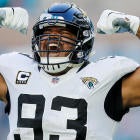No matter what happens between the NFL and NFLPA when they chat about a new collective bargaining agreement in Indianapolis during the scouting combine this week, there is a looming vote for all 1900 players in the union.
The NFLPA showed last week, by moving forward with the negotiating process despite the vote going 6-5 against endorsing the current proposal that those very same members of the executive committee spent months hashing out with the owners, where this all is eventually going. And regardless of what all 32 union reps eventually end up voting, some version of the 17-game agreement is going to go before the full membership of the organization to determine if a majority of players believe it is in their best interest.
Beyond that, things are somewhat fuzzy.
Precisely how much change can come from Tuesday's meeting varies depending on whom you speak to. Exactly when the union will turn things over to all constituents is unclear as well. It could be as soon as Wednesday. How much will the fact that a majority of the men who actually negotiated this deal then voted against it last week matter to the average NFL player? How closely are the rank and file paying attention to a tedious process that has already taken some unusual twists and turns?
After speaking to a number of players and a swath of agents -- some who are among the biggest and most prosperous in the industry and others whose financial existence is tied more to players making the veteran-minimum salary -- I can assure you that no one knows precisely what to expect from a vote of all players. There is no polling data to cull. This isn't an election with predictive metrics and statistical analysis to cull from.
There are plenty of educated opinions leading to informed guesses -- but nothing approaching any sort of scientific threshold and nothing definitive to assert. Many can agree that what transpired on Friday was a somewhat odd look from the NFLPA at the very least, but how much it may sway the way players vote on this CBA varies depending on whom you speak to.
A few prominent agents I spoke to told me the fact that DeMaurice Smith, head of the NFLPA, has not cultivated strong relationships with many in their industry and has been downright combative with them at times is doing him no favors now in trying to complete this process. Outside of Drew Rosenhaus, who has long had close ties to this NFLPA administration, I haven't heard of agents who are inclined to push this current deal to their players or who are eager to defend it. Again -- how much of an impact that would have one way or the other is difficult to quantify.
The fact that prominent members of the Executive Committee themselves, like Richard Sherman, seem to detest the very concept of 17 games, is well known throughout the game -- but will journeymen players really care?
"The fact that vote was 6-5 against this deal matters," one top agent told me. "If it was 9-2 (in favor), and the only two opposed were Sherman and (outspoken critic Russell) Okung, that would be one thing. But they wouldn't even get six votes out of 11. That's a red flag."
Several other agents, who represent largely anonymous players, however, saw things from a different perspective.
"Most of my guys are year-to-year," one agent told me.
"They aren't thinking three years ahead, let alone another contract ahead. They know, and their wives know, that they have a chance to make another $90,000, for doing the same job, and getting some additional benefits, and they don't have to risk as much in the preseason and practice. That's what they care about. Not what Richard Sherman thinks about this CBA, one way or the other."
Even those I spoke to who were most critical of the proposal that is on the table, and the process that has led us to this Tuesday, understood there was nothing to lose by pushing the vote back. There are some fallacies being propagated that simply aren't passing muster with anyone who has a vested stake in this outcome.
The NFL has no shortage of people in the media dying to carry its water and make bold (faux) proclamations about the owners cutting off all talks and refusing to budge on anything and cutting off all future negotiations. That's poppycock. There are billions at stake and the owners cannot wait to re-open those TV contracts and to dive, headfirst, into the ridiculous revenue streams that gambling will provide, and shutting down this dialogue does them no good.
They know it. The union knows it.
Scare tactics and negotiating through the media is not going to work. There is too much at stake for both of these sides for either to merely take its ball and go home. And with a year still left on the current deal, there aren't any artificial deadlines that or fake redlines that anyone is going to make that would actually hold. Continuing to have a substantive give-and-take -- the kind that has been going on for over a year and allowed these parties to make unprecedented progress on this labor deal in the first place -- and being open to some tweaks and alterations that could help make this deal final are in the best interest of all involved.
Being open to going along with some opt-outs for either side, based on certain economic thresholds being met, which could make it a seven-or-eight year deal, ultimately, instead of 10, should be explored if necessary. It shouldn't be a deal-breaker and might actually help put this document to bed. The NFL being willing to pay any player his full prorated salary on an existing contract for the 17th game once it becomes part of the schedule is an easy give back on the owners' behalf.
My gut instinct is, with such a large portion of the 1900-voting party in the NFLPA comprised of players on rookie deal or minimum contracts with almost nothing guaranteed, that the current deal would pass. Players would vote with their pocketbooks on what he prospect of more money and better benefits and more jobs would do for their earning potential, and they would vote accordingly no matter how many Tweets a guy like JJ Watt, who has long been set for life, sends out.
And I don't think it would change all that much even if the union reps voted against it. But the fact the NFLPA is handling things the way it is, and the fact that both sides agreed to push back the start of the franchise tag period, indicates their intent to try to hammer this out ASAP, and a little good will by the owners this week might go a looong way. Now is time for the carrot, not the stick.
Phillips will meet a robust free agent market
Bills defensive tackle Jordan Phillips is a few weeks away from killing it on the open market. A guy who was a waiver claim in 2018 and playing on a one-year deal is going to now be in a position to make life-changing money, and he will be the object of several team's affection this week at the combine.
The Bills have a lot of assets tied up in the defense already, and they selected interior defensive lineman Ed Oliver with their first pick a year ago. Tagging Phillips would be steep and the sense around the league is that he will hit the open market just after nearly hitting double-digit sack totals in 2019 from an interior position. If the Chiefs find a way to tag tackle Chris Jones and keep him in the market, then things are even all the more robust for Phillips, but even if Jones is free the upside he's flashed is not going unrecognized.
A slew of edge rushers are getting tagged, the overall market for pass rushers is going to be limited, and Phillips, a handful at 6-foot-6, is hitting the market at just 27 years old and he already has NFL coaches and executives excited about the possibilities with the former second-round pick building off of his breakout 2019 season.
Jacksonville could be active in the trade market
I will be very interested to see which veterans if any, the Jacksonville Jaguars end up trading. They are getting ready to face the reality of salary cap hell and rival executives believe several of their better players will be cut if they can't be dealt, and that always makes it difficult to anything of value for them now (which explains why Jalen Ramsey should have plenty of company after being shipped out at the trade deadline).
Calais Campbell has a trade market – albeit limited by his age and $15M salary – and should be marketed to all comers. Moving Nick Foles would be impossible, and probably ditto for Marquise Lee, but AJ Bouye or Brandon Linder might fetch a few assets in return. Offensive guard Andrew Norwell should be a trade candidate even though it was pretty recently the Jags signed him to that record-setting contract. Dealing from a position of weakness is tough in this league. Let's see how creative they are willing to get.
















